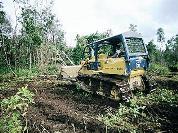 Papua, the Indonesian part of the island of New Guinea, belongs to the lungs of this world as it contains 31,5 million acres of tropical rain forest.
Papua, the Indonesian part of the island of New Guinea, belongs to the lungs of this world as it contains 31,5 million acres of tropical rain forest.
If the trees were to be cut, it would mean a threat to the livelihood and culture of many Papuan tribes. Deforestation means the destruction of their medicinal and food resources, expelling their ancestors and committing a heinous crime against nature. Deforestation will lead to suffering, disaster and chaos for the Papuans The forests form a part of their heritage.
Yet, deforestation also offers opportunity. The cutting of forest to make way for Palm oil plantations, could provide an important source of income for Papua. However, among the UN, the world Bank and the private sector, there are plans to use existing rainforests as a form of exchange for the REDD Program( Reducing Emissions from Deforestation and Forest degradation in Developing countries. Through this mechanism underdeveloped countries are then paid to retain the trees in their forests. This mechanism would enable Papuans to fight against deforestation but no firm commitments were made at the UN Summit in December 2009 in order to counteract climate change in this way.
Content:
1. The significance of the forest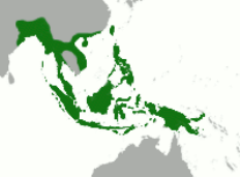
2. Much of the tropical rainforest can be saved
3. Ilegal logging on the political agenda
4. Case study at Wasur
5. The Forests belong to the Papuans
6. Environmental benefit is lost by logging forests
7. Climate change and Palm oil Plantations
8. Purchase of sustainable palm oil on the increase in EU-Countries
9. Links
10. Sources
1. The significance of the forest
Papuans know the value of their forests from their own cultural tradition, which is passed on from one generation to the next. They did not need to be informed of this by either the Dutch or the Indonesian rulers. To them it is not a resource that 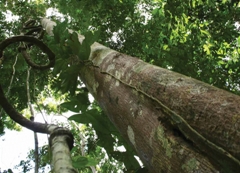 needs cutting in order to earn millions of dollars. The forest has quite a different meaning for Papuans. It is regarded as part of their community. A Papuan community consists of live individuals as well as the spirits of their forefathers and aspects of nature itself. Each community, the clan as well as the tribe within it, has its own designated piece of forest. From a cultural perspective, a Papuan is never separated from the forest. Papuans are self-sufficient and look for food, such as sago, in the direct vicinity. The deeper significance of the rain forest is explained by the following Papuan expression: ’Hutan adalah mama’( the forest is our mother.) The rainforest is a symbol of fertility and reproduction.
needs cutting in order to earn millions of dollars. The forest has quite a different meaning for Papuans. It is regarded as part of their community. A Papuan community consists of live individuals as well as the spirits of their forefathers and aspects of nature itself. Each community, the clan as well as the tribe within it, has its own designated piece of forest. From a cultural perspective, a Papuan is never separated from the forest. Papuans are self-sufficient and look for food, such as sago, in the direct vicinity. The deeper significance of the rain forest is explained by the following Papuan expression: ’Hutan adalah mama’( the forest is our mother.) The rainforest is a symbol of fertility and reproduction.
2.Much of the tropical rainforest can be saved.
In November 2009 the International Biodiversity Conference was held in Jayapura, which contained recommendation formulated during the UN Climate Change Conference in Copenhagen. Governor Barnabas Suebu of Papua proposed a four point plan in order to retain half of the rain forest of Papua. He wants a six million 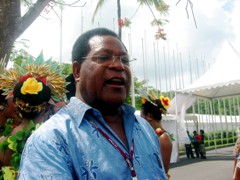 acre reservation of sustainable forest managed by local communities under REDD. In exchange, he is prepared to limit land for the production of sustainable palm oil to 830.000 acres, which amounts to one fifth of the area set aside for logging concessions. Suebu stated that Indonesia is heavily dependent on the forest in Papua for biodiversity and the oxygen level deemed necessary. To save the remainder of the forest in Papua, he invokes the ‘Special Autonomy’ status which acknowledges the forests are owned by local Papuan communities. In December 2008, a moratorium (a ban) on logging took effect. To control this Governor Bas (from Barnabas) instated a new forest police force. In total 1500 officers are being trained, 90 % of which are indigenous Papuans, in order to protect the forests. For the law enforcement in the forest, a budget of 30 billion RP ( E 2,27 million ), has been made available. This is to prevent illegal logging, illegal plantations and the exceeding of logging quotas that have been issued. For his progressive attitude towards conservation, the governor of Papua was hailed to be “A true conservation Hero” by the American time Magazine in October of 2007.
acre reservation of sustainable forest managed by local communities under REDD. In exchange, he is prepared to limit land for the production of sustainable palm oil to 830.000 acres, which amounts to one fifth of the area set aside for logging concessions. Suebu stated that Indonesia is heavily dependent on the forest in Papua for biodiversity and the oxygen level deemed necessary. To save the remainder of the forest in Papua, he invokes the ‘Special Autonomy’ status which acknowledges the forests are owned by local Papuan communities. In December 2008, a moratorium (a ban) on logging took effect. To control this Governor Bas (from Barnabas) instated a new forest police force. In total 1500 officers are being trained, 90 % of which are indigenous Papuans, in order to protect the forests. For the law enforcement in the forest, a budget of 30 billion RP ( E 2,27 million ), has been made available. This is to prevent illegal logging, illegal plantations and the exceeding of logging quotas that have been issued. For his progressive attitude towards conservation, the governor of Papua was hailed to be “A true conservation Hero” by the American time Magazine in October of 2007.
3. Ilegal logging on political agenda
In the nineties, illegal logging and the illegal trade of timber were put on the international political agenda of several publications by social institutions. In 1997, various countries were invited by the Intergovernmental Panel on Forests (IPF) to do research and to exchange information on the nature and extent of illegal trade on timber products. They were also encouraged to consider effective measures to deal 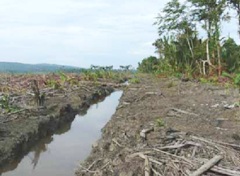 to the illegal timber trade.
to the illegal timber trade.
Kaya Lapia Indonesia (KLI) is a major logging company in Papua with logging concessions totalling 1.4 million acres ( a quarter of the total area available under the concessions, but not all of these are active). The conservation organisation Green peace has repeatedly caught KLI for illegal logging practices. The company illegally cut down trees within a strip of 50 meters from streams. As a result, the streams became congested and polluted. Often the only source of drinking water, they then become unusable for the locals. Greenpeace noted that local Papuans receive much less or even no compensation for the trees felled in their area. Greenpeace claims that both illegal and legal loggng in Papua, is often protected by corrupt elements in the Indonesian army and the police. Sometimes local authorities and officials also have commercial interests in logging. A good proportion of the illegal timber still comes to Europe; more than three quarters of total imports is either illegal or suspicious.
4. Case study at Wasur
A concrete example of mismanagement is the Wasur National Park near Rawa Biru on the border of Papua New Guinea(PNG), where a lot of wood is being logged illegally. The park lies in a lowland forest and is known for its biodiversity. Around 2500 Papuans live in 14 villages. They get their food from the rainforest and hunt in the park with bows and arrows on birds, deer, kangaroos, wild pigs and reptiles. Their existence is threatened by illegal logging and hunting with modern weapons. 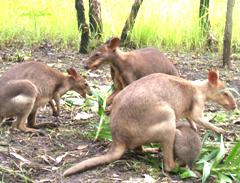 According to a leader of the Kanume tribe, it is pretty hard wildlife to shoot wildlife these days. “As easy as it was to catch five animals, it has now become difficult to catch one , even though it is a smaller piece of wood." In 2005 Papuans got 10.000 rupiah ( E 0.75) for a kilogram of kangaroo meat on the markets and 15,000 rupiah ( E 1.13 ) for a kilo of venison. They use the money to buy rice, sugar, coffee and soap. The monthly cost of living of a family was then about 400,000 rupiah ( E30.28 ). The modern economic system has lowered Papuan’s lifestyle because they hunt only for low value items and the sale of forest products, such as papaya, oranges and nuts, also provides too little a yield. The locals still hunt using sustainable methods. Hunting is not allowed at certain times in certain areas. Poles marked with coconut leaves mark a forbidden area. The system, known as Sasi, is designed to give animals the chance to multiply. This system has proven that animals can be protected from extinction. Simple agriculture and hunting are the main skills of Papuans in and around Merauke. Such skills have sustained them for hundreds of years without modern intervention
According to a leader of the Kanume tribe, it is pretty hard wildlife to shoot wildlife these days. “As easy as it was to catch five animals, it has now become difficult to catch one , even though it is a smaller piece of wood." In 2005 Papuans got 10.000 rupiah ( E 0.75) for a kilogram of kangaroo meat on the markets and 15,000 rupiah ( E 1.13 ) for a kilo of venison. They use the money to buy rice, sugar, coffee and soap. The monthly cost of living of a family was then about 400,000 rupiah ( E30.28 ). The modern economic system has lowered Papuan’s lifestyle because they hunt only for low value items and the sale of forest products, such as papaya, oranges and nuts, also provides too little a yield. The locals still hunt using sustainable methods. Hunting is not allowed at certain times in certain areas. Poles marked with coconut leaves mark a forbidden area. The system, known as Sasi, is designed to give animals the chance to multiply. This system has proven that animals can be protected from extinction. Simple agriculture and hunting are the main skills of Papuans in and around Merauke. Such skills have sustained them for hundreds of years without modern intervention
5. Forests belong to the Papuans
Viktor Kaisiëpo ,who resided in the Netherlands up until his death on 5 Februari 2010, and who was the international representative of the Dewan Adat Papua, the 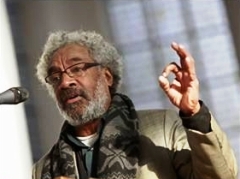 Papuan Indigenous Council, stated in 2006: "The illegal logging will continue as long as there is a market where good money is paid for the timber. Europe and the U.S. should assist the Papuans with reducing illegal logging, by tightening their own laws on timber imports. Good and transparent governance in the forestry sector is a prerequisite for making sustainable use, the protection of natural resources and the use of indigenous methods possible. Only when illegal actions in the forestry sector are banned, can steps be taken towards effective protection and sustainable forest management. There are so many pristine forest areas on the island of New Guinea, that governments and companies think they can just hack the rainforest, " Kaisiëpo continued. "But these forests are owned by the people who live there. The Papuan peoples have protected the forests for generations and used them for their survival. The logging has also affected the social and economic situation of the people on the island. Development and protection of biological diversity will only be sustainable if there is local support for it ", Kaisiepo said.
Papuan Indigenous Council, stated in 2006: "The illegal logging will continue as long as there is a market where good money is paid for the timber. Europe and the U.S. should assist the Papuans with reducing illegal logging, by tightening their own laws on timber imports. Good and transparent governance in the forestry sector is a prerequisite for making sustainable use, the protection of natural resources and the use of indigenous methods possible. Only when illegal actions in the forestry sector are banned, can steps be taken towards effective protection and sustainable forest management. There are so many pristine forest areas on the island of New Guinea, that governments and companies think they can just hack the rainforest, " Kaisiëpo continued. "But these forests are owned by the people who live there. The Papuan peoples have protected the forests for generations and used them for their survival. The logging has also affected the social and economic situation of the people on the island. Development and protection of biological diversity will only be sustainable if there is local support for it ", Kaisiepo said.
The provincial government in West Papua has passed a law under which the forests are owned by the communities, who have managed these forests in a sustainable manner for many generations The central Indonesian government however, thinks that the forests are owned by the state. The Papua Service Management of Natural Resources and Environment said in November 2009 that the proceeds from REDD activities should benefit the local communities and not the central government in Jakarta.
Deforestation and illegal logging often lead to conflicts with local people who depend on the forests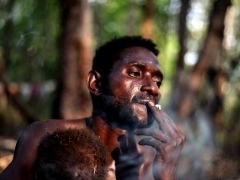 for their livelihood. In traditional agriculture, the woman play a major role in the whole cycle of planting, caring for and harvesting the crops, which is also reflected in her economic and social position. The advent of o palm oil plantations has changed the work and role of women. After other Indonesian islands like Java, Sumatra and Borneo where felling of forests was widespread, the island of New Guinea is third biggest, after the Amazon and Congo Basin, and one of the last pristine forests on Earth. Scientists emphasize that the region is of great importance for the conservation of biodiversity worldwide. With one percent of the surface, the island of New Guinea represents five percent of total global biodiversity. In February 2006, a scientific expedition explored an untouched piece of nature in the jungles of Papua. There they encountered legendary birds and plant species never identified before.
for their livelihood. In traditional agriculture, the woman play a major role in the whole cycle of planting, caring for and harvesting the crops, which is also reflected in her economic and social position. The advent of o palm oil plantations has changed the work and role of women. After other Indonesian islands like Java, Sumatra and Borneo where felling of forests was widespread, the island of New Guinea is third biggest, after the Amazon and Congo Basin, and one of the last pristine forests on Earth. Scientists emphasize that the region is of great importance for the conservation of biodiversity worldwide. With one percent of the surface, the island of New Guinea represents five percent of total global biodiversity. In February 2006, a scientific expedition explored an untouched piece of nature in the jungles of Papua. There they encountered legendary birds and plant species never identified before.
6. Environmental benefit is lost by logging forests
Deforestation has a significant impact on climate change. Forests are major carbon stores. Trees extract carbon dioxide from the air for their growth , they decompose 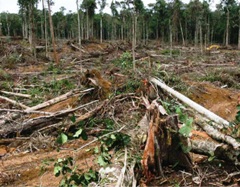 the greenhouse gases, release oxygen and store the carbon in the wood. If the trees are felled, the environmental benefit is lost. But countries which rely on forestry miss out on their earnings by not cutting trees : It means no wood yield, no livestock, no argriculture or mining. It is argued that there should be some compensation for the loss of income. Western countries, under the Kyoto Protocol are obliged to reduce carbon emissions. They can do this in part by planting forests, which provides CO2 compensation under the Clean Development Mechanism. Countries, also which do not have any forests, can also benefit from this scheme. A similar scheme, the Reduced Emissions from Deforestation Mechanism and Degradation is now used to prevent logging. REDD also considers the degree of biodiversity. According to a current REDD plan, 30 billion euros are needed on an annual basis to save half the world’s rainforest. The money could come from a forest fund which requires contributions from governments of industrialized countries . Another approach is to use a portion of the proceeds from emissions trading in CO2 credits. According to Governor Suebu, trading carbon credits is one of the most cost effective ways to tackle climate change.
the greenhouse gases, release oxygen and store the carbon in the wood. If the trees are felled, the environmental benefit is lost. But countries which rely on forestry miss out on their earnings by not cutting trees : It means no wood yield, no livestock, no argriculture or mining. It is argued that there should be some compensation for the loss of income. Western countries, under the Kyoto Protocol are obliged to reduce carbon emissions. They can do this in part by planting forests, which provides CO2 compensation under the Clean Development Mechanism. Countries, also which do not have any forests, can also benefit from this scheme. A similar scheme, the Reduced Emissions from Deforestation Mechanism and Degradation is now used to prevent logging. REDD also considers the degree of biodiversity. According to a current REDD plan, 30 billion euros are needed on an annual basis to save half the world’s rainforest. The money could come from a forest fund which requires contributions from governments of industrialized countries . Another approach is to use a portion of the proceeds from emissions trading in CO2 credits. According to Governor Suebu, trading carbon credits is one of the most cost effective ways to tackle climate change.
7. Climate change and palm oil plantations
The Netherlands is the largest importer of Indonesian palm oil in Europe. For the production of this palm oil, almost 130,000 hectares of forest destroyed was in Indonesia between 1995 and 2005. In Papua, at least 3 million hectares is 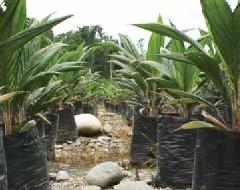 reserved for palm oil plantations. Large multinationals such as Unilever, Nestle and Procter & Gamble are also responsible for the destruction of forests, including peat forests, to meet the growing demand for palm oil. The peat forests, including those in Papua, are one of the richest stores of CO2 in the world. When the peat is drained or burned to build palm oil plantations, the carbon that has been stored in the peat, will then escape.. This eventually leads to a huge change in climate. Indonesia has now decided that peat forests should not be converted into oil palm plantations. Greenpeace called for an immediate ban on deforestation for the purpose of creating palm oil plantations. Plantations in Papua have been built in Merauke, Upper Digul and Mappi, in areas around Jayapura (Arso, Lereh, Keerom, Sarmi, etc.), Nabire, Mamberamo, Waropen, and Mimika. In the Bird's Head , there are plantations in Sorong, Sorong South, Manokwari, Kaimana, and Bintuni. According to Suzanne Kröger, forests campaigner at Greenpeace, palm oil production is completely out of hand. "Because of construction of palm oil plantations, Indonesia is now number three on the list of countries with the highest emissions of greenhouse gases." The bulk of palm oil for the European market, 10 percent of total palm oil production of Indonesia, or 1.5 to 1.8 million tonnes per year, is entering Europe through the port of Rotterdam.
reserved for palm oil plantations. Large multinationals such as Unilever, Nestle and Procter & Gamble are also responsible for the destruction of forests, including peat forests, to meet the growing demand for palm oil. The peat forests, including those in Papua, are one of the richest stores of CO2 in the world. When the peat is drained or burned to build palm oil plantations, the carbon that has been stored in the peat, will then escape.. This eventually leads to a huge change in climate. Indonesia has now decided that peat forests should not be converted into oil palm plantations. Greenpeace called for an immediate ban on deforestation for the purpose of creating palm oil plantations. Plantations in Papua have been built in Merauke, Upper Digul and Mappi, in areas around Jayapura (Arso, Lereh, Keerom, Sarmi, etc.), Nabire, Mamberamo, Waropen, and Mimika. In the Bird's Head , there are plantations in Sorong, Sorong South, Manokwari, Kaimana, and Bintuni. According to Suzanne Kröger, forests campaigner at Greenpeace, palm oil production is completely out of hand. "Because of construction of palm oil plantations, Indonesia is now number three on the list of countries with the highest emissions of greenhouse gases." The bulk of palm oil for the European market, 10 percent of total palm oil production of Indonesia, or 1.5 to 1.8 million tonnes per year, is entering Europe through the port of Rotterdam.
8.Purchasing sustainable palm oil is on the increase in EU
May 2008, the food company Unilever, the world's largest user of palm oil (1.3 million tons annually), decided to use only sustainable palm oil by 2015. All palm oil used in Europe should be of the sustainable variet in the next three to four years. According to a Greenpeace report, the Indonesian company Sinar Mas is still involved in illegal deforestation. Unilever in response to that report, Unilever has decided to suspend all future purchases of palm oil from Sinar Mas . The amount of 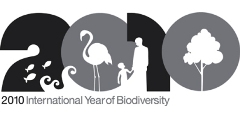 sustainable palm oil imported by EU countries, grew in 2009 to more than one third of the total amount, this according to the RSPO (Roundtable on the Sustainable Palm Oil). Many companies have now accepted the RSPO standard, but according to many NGOs, there is a danger that the non-sustainable palm oil will now be dispersed to China and India. All palm oil, mainly used in foods and cosmetics should come with a certificate of sustainability from the RSPO . At present 15 percent of the palm oil used certified by Unilever is certified, which amounts to about half of the world’s 'environmentally friendly' palm oil in production. Palm oil is now not only used for food but also for bio-fuel, which has resulted in a sharp increase of production in recent years. Depending on the policy in Europe, which paradoxically encourages the use of bio-fuels in the fight against climate change, it can amount to an increase of 5 to 8 percent per year. The protection of forests was to be an important part of the climate agreement in Copenhagen that world leaders had to decide upon. But unfortunately this decision has now been postponed. It is a fact however, that if the forests were to permanently protected, it would mean that the culture and traditions of the Papuans, who depend on forest products, would persist.
sustainable palm oil imported by EU countries, grew in 2009 to more than one third of the total amount, this according to the RSPO (Roundtable on the Sustainable Palm Oil). Many companies have now accepted the RSPO standard, but according to many NGOs, there is a danger that the non-sustainable palm oil will now be dispersed to China and India. All palm oil, mainly used in foods and cosmetics should come with a certificate of sustainability from the RSPO . At present 15 percent of the palm oil used certified by Unilever is certified, which amounts to about half of the world’s 'environmentally friendly' palm oil in production. Palm oil is now not only used for food but also for bio-fuel, which has resulted in a sharp increase of production in recent years. Depending on the policy in Europe, which paradoxically encourages the use of bio-fuels in the fight against climate change, it can amount to an increase of 5 to 8 percent per year. The protection of forests was to be an important part of the climate agreement in Copenhagen that world leaders had to decide upon. But unfortunately this decision has now been postponed. It is a fact however, that if the forests were to permanently protected, it would mean that the culture and traditions of the Papuans, who depend on forest products, would persist.
9.Links
-Time Magazine names governor Barnabas Suebu “A Conservation Hero” in October of 2007.
- Papua, Indonesia's Last Forest Frontier. According to Greenpeace (October 2008), the forests in Papua are being threatened by the palm oil industry.
- The concept of REDD is explained 'As part of the Solution' by the VN and world leaders ( September 2009).
- The video 'Why bio-fuel production is contributing to climate change' of the English Channel 4 explains why the proposed EU guidelines on bio-fuels are in fact a treat to tropical rain forests (broadcasted on 19 February 2009)
10. Sources
- Pristine forests described and put on the map by Greenpeace
- Declaration of the Governors of Aceh, Papua and Papua Barat on Climate Change, Nusa Dua, Bali, April 26, 2007.
- REDD-monitor. Analysis, advice, news and opinions about emission , deforestation and degradation of forests.
- Indonesia signs document to participate in REDD Program Antara News on 29 November 2009.
- The dire consequences of uncontrolled logging in Rain forests Report on workshop of a conservation organisation and Papua Lobby about biodiversity in Papua ( Nijmegen Mei 2006).
- CO2 levels in Indonesia appear to be much higher than reported, according to Wetlands International. The organisation managed to get hold of a confidential report by the Indonesian National Committee with regard to climate change( September 2009).
- At the Bali-conferentie VS is called upon by Kevin Conrad, the speciale envoy for Papua New Guinea, to take a stand rather than avoid conflict ( 23 september 2007).
- 'Up for Grabs' indicates that deforestation and the advent of Palm oil plantation in 5 million hectares, threatens the local Papuan communities aan dat de ontbossing en de komst van plantages op 5 miljoen hectare land de bossen en lokale gemeenschappen in Papua bedreigt. A video and rapport by NGO's EIA and Telapak ( November 2009,pdf).
- Conservation organisations fear that more and more forests will be affected by the palm oil industry in South-east Asia. Is bio-fuel becoming a nightmare? An article from the series uit Planet Kopenhagen (December 2009).
- “Losing Ground – The human rights impacts of oil palm plantation expansion in Indonesia”, Friends of the Earth, Sawit Watch, Life Mosaic,( Februari 2008,pdf).
- Advice and comments: Ir. Evelien van den Broek (from the Dutch department of the International Union for the Conservation of Nature, www.iucn.nl).